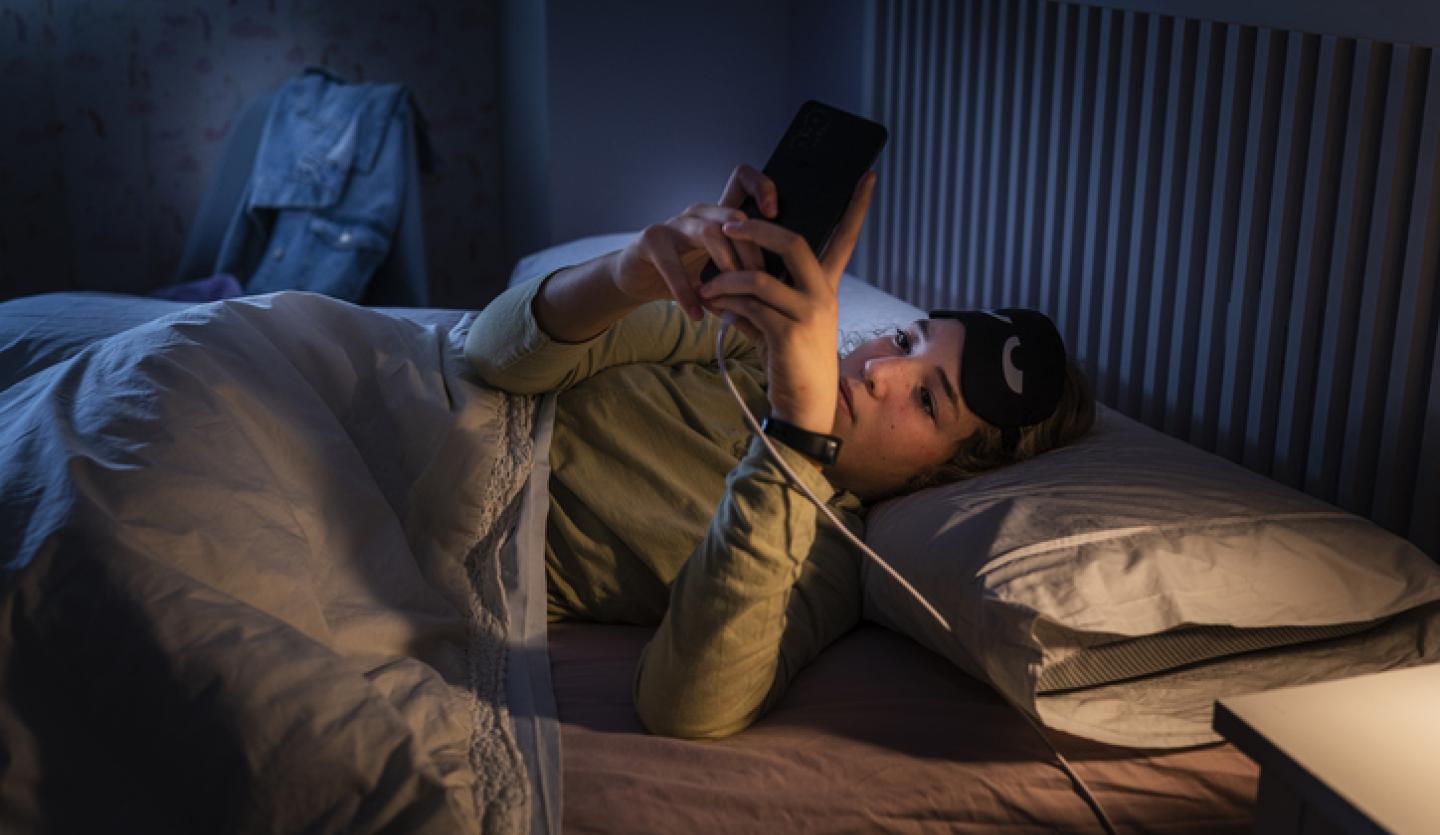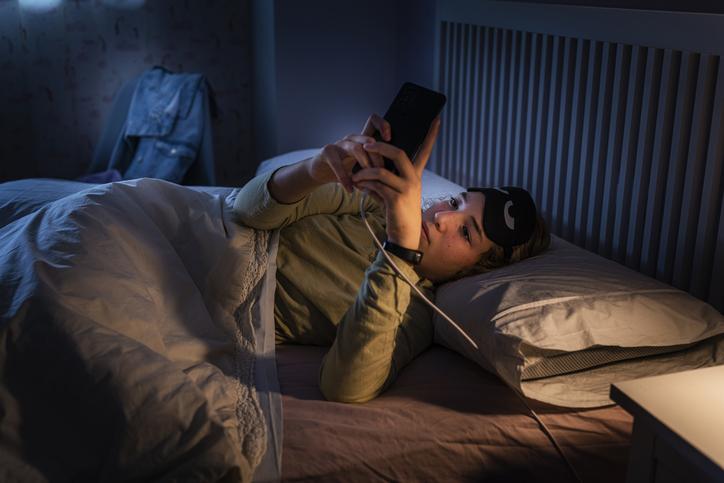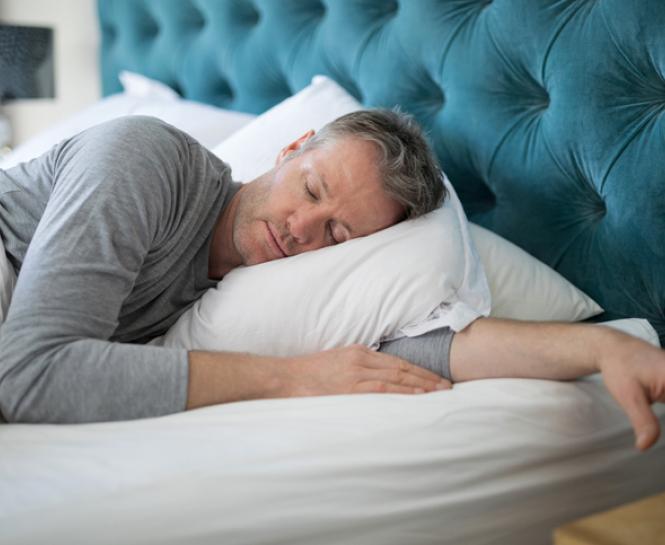Most of us have had trouble falling or staying asleep at some point. Maybe you are stressed and stay up worrying about finances, family obligations, work or school. Perhaps you ate or drank something that disrupts your sleep. Or you traveled to a new time zone, and jet lag set in. You can have trouble falling asleep for many reasons, and it is common and typically short-lasting.
However, some people who frequently have trouble falling asleep may develop insomnia.
What is insomnia?
Insomnia is a common sleep disorder caused by disruptions in the body’s circadian rhythms (our internal body clock). Circadian rhythms affect the sleep-wake cycle, metabolism and temperature.
Short-term insomnia is the most common sleep disorder, lasting days or weeks. Long-term insomnia (chronic insomnia) lasts longer—at least three nights a week for three or more consecutive months. It is a serious health condition that can lead to other problems, such as sleep apnea, high blood pressure, heart disease, Type 2 diabetes, and depression.
Insomnia has two main types: primary and secondary.
Primary insomnia occurs when sleep problems are not associated with an existing health condition.
Secondary insomnia occurs because of an existing health condition, such as chronic pain, heartburn, asthma, depression, arthritis or cancer.
What is the recommended amount of sleep?
The recommended amount of sleep for adults is between seven to nine hours.
“It can be easy to dismiss not getting the recommended hours of sleep when our lives are busy,” said David Warkentin, System Director of Catholic Health’s Sleep Service. “But sleep is essential to a healthy lifestyle, just as important as good nutrition and exercise.”
What are the symptoms of insomnia?
Common symptoms of insomnia include:
- Difficulty falling asleep, or lying awake for long periods of time.
- Not sleeping for a long time and then waking up after falling asleep.
- Going to bed and waking up too early.
- Not feeling rested when starting your day.
What causes insomnia?
Common causes of insomnia include:
Stress and anxiety. Racing thoughts about stressors in your life can make you anxious and unable to fall asleep.
Traveling. Adjusting to different time zones can cause jet lag that affects circadian rhythms.
Work schedule. Creating a routine sleep schedule can be more difficult if you work alternate day and night shifts, late hours or overnight.
Inconsistent sleep routine. Not having a designated bedtime—some days you stay up late, go to bed too early, or take long naps—can make it harder for your body to fall asleep and stay asleep.
Technology and TV. Scrolling through social media, playing games, reading the news on our phones or laptops or watching TV while in bed can keep us alert and distract our minds and bodies from focusing on falling asleep.
Studies have shown that the blue light from our devices affects melatonin production and our sleep quality.
Diet. Eating a heavy meal too close to bedtime can make it difficult to fall asleep, especially if it also causes heartburn. Drinking alcohol prevents your body from going into the deepest, most restful stages of sleep. Stimulants like coffee, caffeinated drinks and nicotine also make it hard to fall asleep.
Try to drink two to three hours before bed so you can limit going to the bathroom and disrupting your sleep.
Activity. Regular exercise can make it easier to fall asleep at bedtime, while an inactive lifestyle can make it more challenging.
Gender. Women are more likely to experience insomnia, including when pregnant, going through premenstrual syndrome (PMS) and perimenopause/menopause.
Sleep apnea is more common in men and can contribute to insomnia.
Age. Insomnia is more likely in people 60 and older because of changing health habits and medical conditions that disrupt their sleep patterns.
Existing health conditions. Obstructive sleep apnea (OSA), restless legs syndrome, chronic back pain, gastroesophageal reflux disease (GERD), and attention-deficit/hyperactivity disorder (ADHD) are some of the many health conditions that can make it hard to fall asleep or stay asleep.
Medications. Prescription medications, including those for depression and blood pressure, may disrupt sleep. Over-the-counter medicines, such as cold and allergy medicines, can also affect sleep.
What are the effects of insomnia?
“Trouble falling asleep and disrupted sleep—whether getting up often or too early—can lead to insomnia, affecting our mental and physical health,” said Mr. Warkentin.
Insomnia can lead to:
- Poor concentration or making errors that affect job or school performance.
- Memory issues.
- Being accident-prone.
- Driving unsafely due to slower response time or feeling sleepy at the wheel.
- Worrying about or constantly thinking about sleep.
- Mental health issues such as fluctuating moods, depression or anxiety.
- Abuse of drugs or alcohol.
- Feeling tired and wanting to sleep during the day.
- Health complications like high blood pressure, Type 2 diabetes and heart disease.
“Insomnia creates a difficult cycle for many of my patients,” said Mr. Warkentin. “If they already suffer from a mental health condition like anxiety or depression, insomnia exacerbates it. Or, if they already have concentration issues, insomnia makes it harder for them to focus.”
He emphasized the importance of seeking professional help to prevent insomnia from becoming long-term and chronic with more health complications.
How is insomnia treated?
If you often struggle to fall or stay asleep, it is important to discuss your concerns with your primary care physician (PCP). They can document your sleep issues and refer you to a board-certified sleep specialist for a thorough insomnia evaluation and tailored treatment plan.
“Our board-certified sleep specialists will prioritize lifestyle modifications, such as improving diet, increasing exercise, and implementing stress management techniques,” said Mr. Warkentin. “These changes are crucial for helping patients overcome insomnia."
He explained that this approach, known as Cognitive Behavioral Therapy for Insomnia (CBT-I), encompasses key components like cognitive restructuring, sleep education, sleep restriction, stimulus control, and relaxation techniques.
He also noted that patients with severe insomnia might also require medication to help restore a normal sleep schedule.
"Studies have shown that the most effective treatment for severe insomnia involves a combination of CBT-I and the aid of short-term medication," said Mr. Warkentin.
What tips can help prevent insomnia?
“I often recommend that patients get out of bed if more than an hour has passed and they cannot fall asleep,” said Mr. Warkentin. “Trying to force yourself to sleep only makes you more anxious and less likely to fall asleep.”
He also recommends:
- Find a hobby that calms you, like reading or knitting. (Avoid using e-reading devices that have blue light.)
- Do breathing exercises.
- Drink non-caffeinated herbal tea or tart cherry juice before bedtime.
- Journal to write down what is bothering you to help calm the mind. (Avoid writing on electronic devices that have blue light.)
- Take a warm bath.
- Listen on low volume to instrumental music.
- Use a device with calming sounds like white noise.
- Make a sleep plan when traveling for work or the holidays.
Mr. Warkentin explained that a board-certified sleep specialist will help you find and practice bedtime rituals and a consistent sleep schedule that is best for you and your specific needs.
“Insomnia is treatable, and you can reduce the risk of it returning when you create a plan that works for you, whether at home or traveling,” he said.







